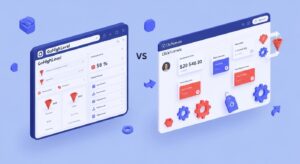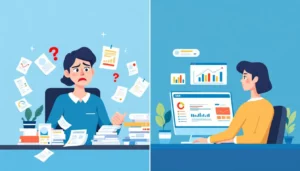How CRM Improves Agency Productivity and Efficiency

Introduction
Creative thinking and getting things done have always been important in running a business, but these days, success is measured by more than just great ideas. People expect agencies to get things done faster, grow without lowering quality, and use numbers to show how valuable they are. It’s important for businesses to be efficient and productive, but it can be hard for many to keep up with both while handling leads, clients, and internal processes.
CRM (Customer Relationship Management) tools are very helpful in this case. Modern CRMs do more than just keep track of contacts with clients. They also automate chores, make communication better, and help teams focus on the most important tasks. This makes the link between CRM and work output better than ever. Agencies can stop operating in a reactive way if they have the right CRM. Instead, they can set up processes that are reliable, efficient, and drive steady growth.
Why Productivity and Efficiency Matter for Agencies
When issues come up, they are not the same as those in many other areas. Most of the time, they are in charge of several clients in different industries, and each one needs their full attention, reports, and to be able to reach them. Without efficient processes, this level of complexity loses time, makes work go over and over again, and leaves chances on the table.
You should try to get as much work done as you can with the tools you have. Getting things done quickly and well is all about making sure that methods are lean and helpful. They work together to help the business grow. When people on a team communicate easily with each other, they close deals faster, finish projects on time, and keep clients happy. It has been found by McKinsey that businesses that use digital tools to boost output can make up to 20% more money than their rivals. Agencies get the tools they need to do this level of work when they use CRM technology.
Centralizing Client Information
Putting information about clients in order is one of the best and easiest things that a CRM can do. Most of the time, companies keep client information in a lot of different places, such as emails, files, and tools for managing projects. This split-up takes time and makes things less reliable, which slows down production.
Everyone you know about a client is kept in one place when you use a CRM. This includes your contact information, records of conversations, the terms of the contract, and the times of the projects. This consistency clears up any confusion and makes sure that everyone on the team has the same correct information. Because everything is in one place, there is less messaging back and forth and quick choices can be made.
When workers don’t have to spend as much time looking for information, they have more time to do things that help the business grow. This single collection not only makes people more productive, but it also makes it easier for people from different areas to work together.
Automating Repetitive Tasks
There is a lot of time lost in agencies because of doing the same things over and over again. These small but regular tasks add up, like writing follow-up emails and keeping client information up to date. With CRM systems, this work is automated so that teams can focus on strategy and coming up with creative solutions to problems.
Automation can take care of developing leads, setting up training tasks, reminding people to follow up, and even making performance reports. For example, instead of having a manager check each lead individually to see if they got an answer, the CRM can send out emails automatically and let the team know what needs to be done. This not only makes sure that no chances are lost, but it also gives customers a uniform experience.
Gartner studies have shown that companies that automate their CRM systems cut down on administrative work by as much as 25%. This means that in a firm setting, more hours can be spent on client projects and less time is wasted on boring tasks.
Improving Internal Communication
It’s not enough to just do more work to be productive; you need to work better too. There are many times when communication breaks down in agencies. These can be between account managers, creative teams, or the top leaders. Not being able to communicate well can lead to delays, changes, and clients who are angry.
With a CRM, everyone on the team can see changes as they happen, keep track of jobs, and make notes. When a salesperson adds a new customer, the account manager sees it right away. When a project milestone is met, everyone is told right away what the new state is. Because of this, there are no walls between people, and everyone knows what their goals and responsibilities are.
Clear communication through a CRM also cuts down on mistakes, making sure that the delivery team does what the sales team says they will do. This link is important for both work and client trust.
Enhancing Client Relationships
At its core, a CRM is all about people. Strong relationships with customers lead to repeat business, word-of-mouth promotion, and long-term income for businesses. The work gets done faster when clients are pleased because problems are dealt with faster and work is done again more quickly.
Sales and marketing teams may keep in contact with customers using CRMs. Doing little things, like sending reports immediately away or remembering people’s birthdays, makes the customer experience better. If your clients think you care about them, they will remain with you longer.
HubSpot estimates that firms may maintain up to 27% more clients if they use CRM solutions to make their messaging more personal. You save time and generate more money when you maintain customers instead of always looking for and training new ones.
Measuring Performance Through Analytics
If you can’t keep track of how quickly you’re going, it’s hard to go faster. CRMs provide users information and displays that show them how they are spending their time and money. They can tell which leads are most likely to turn into sales, which projects earn the most money, and which customers take up the most time
This means that groups can use facts to decide what to do. Leaders don’t have to guess why work isn’t getting done; they can quickly spot the problem and fix it. In this case, if the agency sees that following up with clients decreases after the first meeting, they can set up automatic steps to fill the gap.
By measuring and growing all the time, agencies teach people to be responsible and do a good job. After putting ideas into action, being efficient is no longer something you do once in a while, it’s something you do all the time.
Supporting Scalability
Scaling without chaos is one of the hardest things for agencies. When new clients come on board, the work load grows, and without the right processes in place, output drops sharply. CRMs give you the organization you need to keep growing.
By automating and centralizing jobs, client contacts, and reports, adding new clients doesn’t stress out the team as much. No matter how big or small the business is, processes stay the same and output stays the same. The difference between small companies and real high-performing organizations is their ability to grow without losing their speed.
According to McKinsey studies, scalable systems are a key part of agency growth. These studies show that companies with well-structured operations can grow up to twice as fast as those with disorganized processes. A CRM is the practical backbone for an agency.
Reducing Errors and Increasing Accountability
It takes time, money, and reputation to fix mistakes. If you miss a client date, lose information, or forget to follow up, these mistakes slow you down and hurt your clients’ trust. Making sure tasks are clear, keeping data safe, and setting up automatic notes are all things that a CRM does to cut down on mistakes.
Also, people are held more accountable. Everything that is done and said to a client is recorded, so managers can quickly find out what went wrong. This openness makes sure that everyone on the team is accountable for their part, which makes everyone feel like they own what they’re doing. When people are accountable for their actions, they work harder because they know that others can see and measure their progress.
Building a Culture of Continuous Improvement
One of the best things about CRMs is that they help businesses get better all the time, not just when something goes wrong. Since agencies can always get to their data, they can try new things, see what works, and make things better. Over time, small changes add up to bigger gains in productivity. It doesn’t happen all at once.
Teams are more driven when they can see how their work is making a difference. People are more likely to do their jobs when they know that they have a direct impact on progress. Not only does this desire to always do better things run more easily, but it also makes it easier to keep workers.

Conclusion
Agents need to do more than just make smart ads to do well in the market today. They need to know how to use the tools that keep things running smoothly, keep clients happy, and keep teams on the same page. CRMs and CRM agency productivity are inextricably linked because these tools turn disjointed processes into streamlined systems that boost output and efficiency.
CRMs give agencies the tools they need to grow in a way that doesn’t hurt the environment. They do this by centralizing client data, managing routine tasks, better communication, and keeping track of results. A modern firm that invests in CRM technology is not only more productive, but also better prepared for the challenges of the future. This is because it can grow as needed, makes less mistakes, and builds stronger relationships with clients.
Leaders in the field, such as HubSpot, Gartner, and McKinsey, have pointed out that companies that use digital tools to boost output always do better than their competitors. The message is clear: if agencies want to be as productive and effective as possible, they should start by making CRM their main method of operation.







